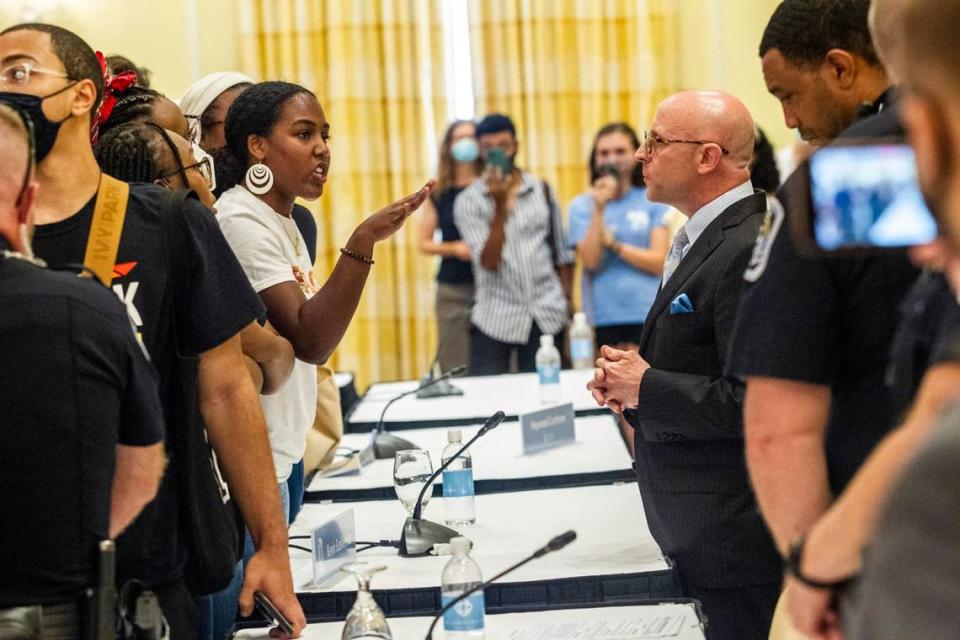New trustees join UNC board. Will they bring the more diverse ideas students want?
- Oops!Something went wrong.Please try again later.
New members starting their terms on the UNC Board of Trustees this month will make the incoming board slightly more racially and ethnically diverse than the outgoing one. But some campus activists say the disconnect between the board and the student body goes deeper.
The board that voted to approve tenure for Nikole Hannah-Jones on Wednesday was made up of 10 white men, one Black man, one Black woman and one white woman. That was their last vote as a board.
The incoming board is a bit more diverse with nine white men, two Black men, one Asian-American man and one white woman.
Still, the board does not represent the student body.
“We’re asking if this board is useful at all,” said Julia Clark, vice president of UNC’s Black Student Movement.
“Going from a board of 10 white males that is not representative and has no transparency to a board with nine white males that is not representative and has no transparency is not the solution,” Clark said. “They’re merely giving us a crumb, and we are not here asking for crumbs.”

Trustees don’t reflect students
UNC-CH enrollment data shows more than half of the student body is female (59%), yet only two women are on the 13-person board. The board was 85% white and now it’s about 70% white, while the student body is 58% white.
Some students have said they doubt any Board of Trustees, regardless of its makeup, can be truly representative of the nearly 30,000 people enrolled in courses at UNC.
The Board of Trustees has one student representative, who this year is Lamar Richards, UNC’s first openly gay Black student body president.
Clark said to be useful at all, the board needs to have more students and in general members with a wider range of views, opinions, ideas and experiences. It also needs younger members, she said.
“We cannot connect with someone that went to Carolina 40 years ago,” she said.
“I think that’s racist and ageist,” said Greensboro-based real estate developer Marty Kotis, who is joining the Board of Trustees after two four-year terms on the UNC System Board of Governors. “I don’t want someone to look at me as a 52-year-old and judge me based on my age. I certainly don’t do that in my business; I don’t judge people on their skin color or their age.”
Kotis said his years on the Board of Governors has shown him that while the student experience at UNC and other universities in the system is an important focus, his first responsibility is to the 10 million residents of the state who help pay to operate and maintain every campus. Students are enrolled for a few years, he noted, but the system has to take the long view for the schools to be competitive and sustainable.
That includes making sure that faculty and staff feel they are fairly compensated, Kotis said. Without talking about Hannah-Jones’ case, Kotis said his gripe about tenure is that it sometimes results in overpaying some professors at the expense of many others. And, because it’s a lifetime contract, it can mean that some professors stay on years after their expertise has become outdated, he said.
So the Board of Trustees has to be representative of the whole state, Kotis said, not just the students, faculty and staff.
“When that electrician or plumber is paying for your education you cannot thumb your nose at them and say they should not have a say in the matter.”

Who are the UNC-CH trustees?
Every two years the UNC System Board of Governors appoints four people to each university’s Board of Trustees, including UNC-CH. The North Carolina General Assembly also appoints two trustees to each school’s board.
Earlier this spring, the Board of Governors voted to add four UNC-CH alumni to that campus Board of Trustees: Former state senator Rob Bryan, former member of the N.C. House of Representatives Perrin Jones, DraftKings executive Malcolm Turner and businesswoman Ramsey White.
The N.C. General Assembly voted to elect Kotis, a Greensboro developer, and Vinay Patel, who owns a chain of hotels in Charlotte.
They replace UNC-CH board Chairman Richard Stevens, Jeff Brown, Munroe Cobey, Haywood Cochrane, Chuck Duckett and Kelly Hopkins. Cochrane is the only one of the outgoing trustees that voted no for tenure for Hannah-Jones.
Returning board members are Vice Chairman Gene Davis, Secretary Teresa Artis Neal, David Boliek, Allie Ray McCullen, Ralph Meekins and John Preyer. Boliek, McCullen and Preyer also voted no on Hannah-Jones’s tenure.
The new trustees’ first meeting with the board is July 14 and 15.
Rep. Graig Meyer, a Democrat serving Orange and Caswell counties, brought up the lack of diversity when the legislature was voting on the slate of candidates for the Boards of Trustees across the UNC system. He said Thursday that the outrage over Hannah-Jones’ treatment by UNC “really highlights the lack of diversity on the UNC board and it’s not just in Chapel Hill. It’s across the whole public university system.
“People really see the universities as being of the people, and they’re really disappointed with how partisan the appointment process has become, and how that has led to a lack of diversity on these boards,” Meyer said.
Meyer was critical of changes that Republicans made in 2016 to the process by which members are appointed to the BOG and to each university’s Board of Trustees. Every current member of the BOG and the UNC-CH Board of Trustees has been appointed under a Republican-dominated legislature.

‘An opportunity to be heard’
Patel, a principal in Sree Hotels, based in Charlotte, didn’t know when he was named to the board in the spring about the controversy over whether Hannah-Jones would get tenure as the Knight Chair in Race and Investigative Journalism in the Hussman School of Journalism and Media.
Reached while traveling in California on a family vacation, Patel said he was glad to hear that Hannah-Jones’s tenure case had been handled by the outgoing board. But the outcry by students and faculty left him wondering how the situation had evolved into a national news story.
Hannah-Jones is a Black woman journalist at the New York Times and the first Knight Chair at UNC-CH not automatically offered tenure. Her advocates accused trustees of unfairly preventing Hannah-Jones from getting tenure in part because she is known for writing about racial issues. She was the creator of the Times’ controversial 1619 Project.
Patel said his family knows something about discrimination. When they were starting out in the hotel business in the 1980s, he said, founders were told they didn’t belong and they were denied loans and franchise opportunities.
As a new trustee and a veteran of the hospitality industry, Patel said, “I look at students as guests of the institution. How do we make them happy, how do we make them feel welcome and safe and secure? What is our responsibility? How do we create that high level of experience and provide that level of service?”
Patel graduated from UNC and now has a son who is a rising junior there. He said he looks forward once school resumes in the fall to hearing from his son, other students, faculty and staff about the environment at the school.
“Once I’m there, I will enjoy listening to groups of students and get a sense of how they are feeling, and give them an opportunity to be heard and not just listened to,” Patel said. “That need for support — that’s universal. It should not be about color, it should not be about race. The university experience is the experience, and it should be beneficial to the entire student body. It should be inclusive.”

